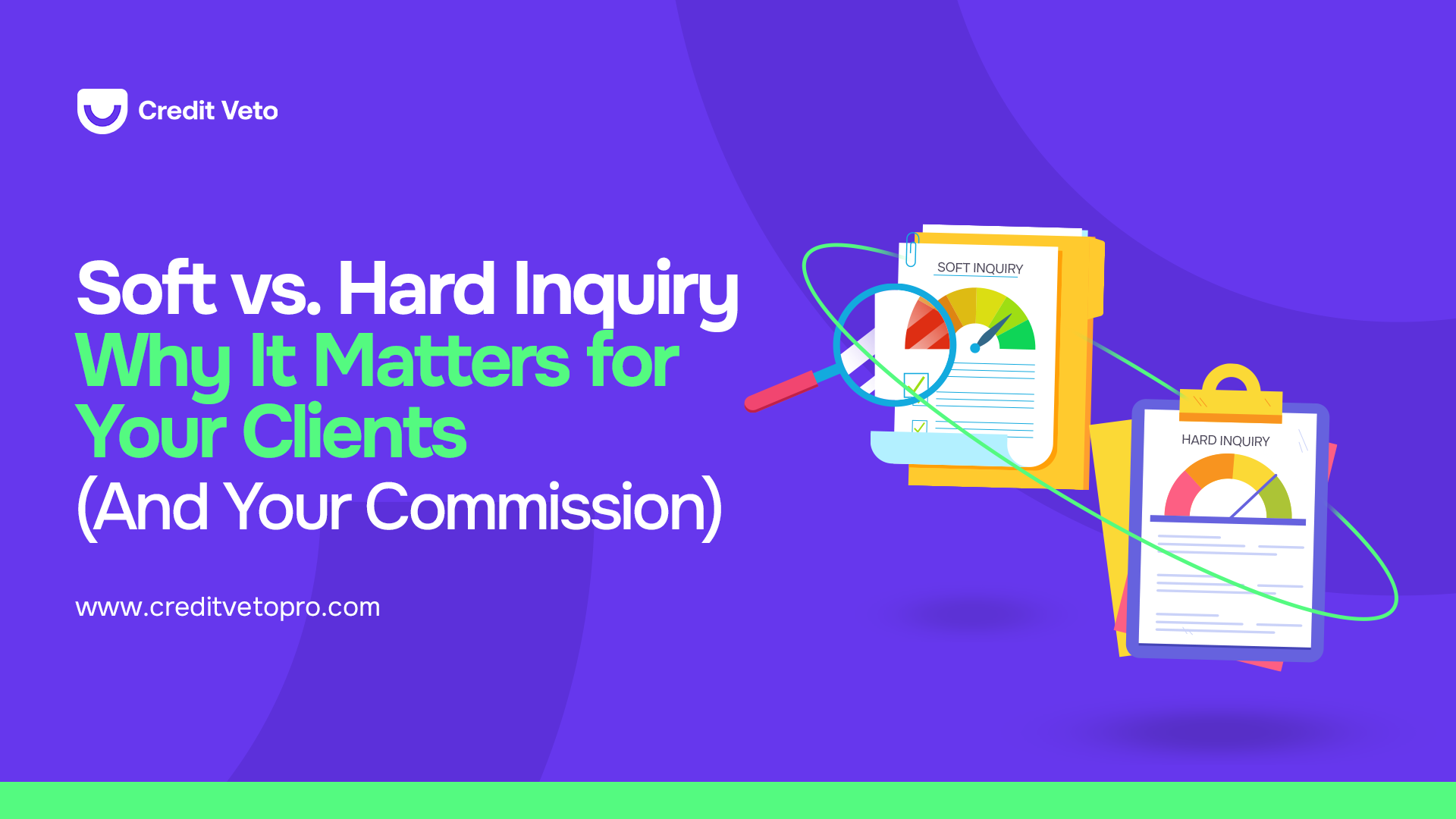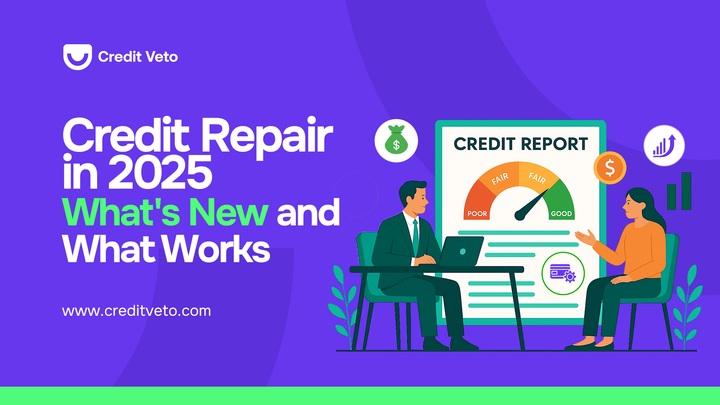Soft vs. Hard Inquiry: Why It Matters for Your Clients (And Your Commission)
Soft vs hard inquiry? Discover how one wrong pull can cost your client a loan—and you a commission. Learn when to use soft pulls, avoid risky mistakes, and protect your closings.

Your client just got denied for a mortgage, and they blame you. What happened? A hard inquiry they didn’t understand tanked their credit score overnight.
As a credit repair specialist or real estate agent, you can't afford to ignore the difference between a soft and hard credit inquiry. Why? Because it’s not just their score on the line—it’s your reputation and your commission.
Most clients have no idea what type of inquiry is being made on their credit file. But you should.
In this guide, you’ll learn the real impact of soft vs. hard inquiries, when each type is triggered, and how to guide your clients toward better outcomes—and more approvals.
Your Client’s Credit Score Dropped—and So Did Your Commission
You’ve done everything right. You’ve helped your client clean up their collections, disputed old negatives, and finally got their score into the “good” range. But now, after a routine pre-approval, their score just dropped again, and you’re getting the blame.
What happened?
A hard inquiry happened.
It might seem small, but one unnecessary hard inquiry can be the difference between your client getting approved or being ghosted.
For professionals like you, it’s not just about knowing the difference between a soft vs hard inquiry—it’s about understanding when to use them, how they affect credit health, and how they impact your reputation (and your commission).
Let’s break this down.
Soft vs. Hard Inquiry—What’s the Difference?
Before proceeding to learn how these credit inquiries affect you and your commission, let's first determine their individual meaning.
What Is a Soft Pull or Inquiry?
A soft inquiry—also known as a soft pull—is a type of credit check that does not impact a person’s credit score. It's a behind-the-scenes look at someone’s credit profile, and it happens when no formal credit decision is made.
Think of it like a gentle peek versus a hard inquiry, which is more like a spotlight.
Soft pulls are typically triggered in low-risk or non-lending scenarios such as
- When a lender is pre-approving someone for a loan or credit card without a full application. This helps them determine if the person may qualify without committing or affecting their credit.
- When an employer runs a background check as part of a hiring process. Some industries, especially financial services, want to ensure financial responsibility, but they use a soft inquiry to do it discreetly.
- When credit monitoring software (like Credit Veto) checks your credit score regularly to keep you informed. These services give you visibility into your credit health without harming it.
- When individuals check their own credit reports using free tools or through official credit bureaus. This is one of the safest and most important habits for building strong credit. Check your credit report for free by signing up for our 7-day free trial here.
One key detail most clients don’t know: soft inquiries don’t show up to lenders. They appear on your credit report but are completely invisible to banks, landlords, or anyone else running a formal credit evaluation.
This is why soft pulls are your best friend in the early stages of helping a client, whether you're pre-screening them for a loan or educating them on their credit situation. No damage, no pressure, just information.
What Is a Hard Inquiry?
A hard inquiry—also called a hard pull—is a formal credit check that does impact your credit score. It’s triggered when a person actively applies for credit, and the lender needs to review their full credit file to make an approval decision.
Unlike soft pulls that happen passively in the background, hard inquiries are intentional, and they signal to credit bureaus that someone is seeking new credit. These typically occur when someone applies for:
- A mortgage loan
- An auto loan or lease
- A credit card
- A personal or business loan
- Store financing or buy-now-pay-later programs
Each hard inquiry can reduce a credit score by about 3 to 10 points, depending on the individual’s overall credit profile. For someone with a thin or fragile file, that dip can have significant consequences, possibly pushing them out of a qualifying range.
What many clients don’t realize is this: Hard inquiries don’t just reflect interest—they reflect risk. Too many of them, too close together, can signal desperation to lenders, making approval harder even if the actual credit score isn’t terrible.
The impact is especially sharp when multiple hard pulls occur outside of the standard 14–45 day window that FICO groups as “rate shopping.” And for professionals like you—credit specialists, realtors, mortgage brokers—that risk can derail the entire process.
This is why it’s critical to protect clients from unnecessary hard pulls, especially if they’re still in the early stages of credit rebuilding or approval planning. A single mistimed hard inquiry can cost them a home, a car, or the rate they truly deserve.
Why Should You Care as a Credit Repair Pro or Agent?
Because every hard pull your client racks up hurts them and you.
The truth is, you’re not just helping clients get approved. You’re helping them protect their score. If you allow unnecessary hard pulls, you could delay their timeline or even disqualify them.
Real-world consequence: One client we worked with had four hard pulls in two weeks, by three different lenders and a car dealership. His score dropped 21 points. That delay cost him the interest rate he needed to close.
Lesson? Soft inquiries should be your first line of defense for all prequalifying stages. Use them until the client is truly ready to commit.
Another Real Story:
One of our clients, named Sarah, was shopping for a home. Her realtor encouraged her to “talk to different lenders”, but didn’t clarify that each lender would pull her credit. Within 10 days, she had four hard pulls on her file. Her score dropped 21 points, and that disqualified her for the rate she needed to close.
She didn’t just lose that home. Her realtor lost that commission.
You are the bridge between what your client wants and what they understand. If you don’t protect their score from unnecessary hits, someone else will and you’ll lose both trust and income.
When to Use a Soft Inquiry (Protect First)
As a rule of thumb:
Soft pulls should be your first line of defense.
They are useful when your client is:
- Pre-qualifying for a mortgage
- Comparing insurance quotes
- Shopping for credit cards
- Checking their own credit
- Using credit monitoring tools (like ours)
They allow you to assess the client’s credit health without risk. You’ll know what’s on their report, how to guide them, and what’s realistic—all without damaging their score or momentum.
When Hard Inquiries Are Unavoidable
Hard pulls are necessary only when your client is fully ready to apply. That includes:
- Submitting a final mortgage or loan application
- Applying for a credit card
- Finalizing a lease (car or apartment)
If a client’s credit is still fragile, or their approval is borderline, do not rush this stage. One hard pull could push them below the threshold—and push your commission out of reach.
Do Multiple Inquiries Hurt More?
Yes and no—depending on the type, timing, and intent behind the pulls.
FICO and VantageScore models understand that consumers shop around. That’s why they group multiple hard inquiries for the same type of credit, like a mortgage or auto loan, into one, as long as they fall within a 14- to 45-day window. This practice is often called rate shopping protection.
So if a client applies with three different mortgage lenders within that window, it will likely count as just one inquiry.
But here’s where things get tricky.
That protection only applies when the inquiries are for the same type of loan. If your client applies for a mortgage, checks out auto loan offers, and later applies for a credit card, those are treated as separate hard pulls. It won’t matter if they happen in the same week—each one will be counted individually and impact their credit score.
And there’s more.
Not all lenders clearly explain whether they’re doing a soft credit check for mortgage pre-approval or a hard credit pull during prequalification. This confusion often leads to clients racking up unintentional hard inquiries, especially when working with multiple agents or brokers who aren’t aligned.
As a credit repair specialist, mortgage professional, or realtor, your responsibility is to guide the client and protect their score. One extra credit hard pull vs soft pull—if done unnecessarily—can reduce your client’s approval odds, cost them better loan terms, or even knock them out of eligibility entirely.
The safest move?
Encourage your clients to ask upfront:
“Is this a soft pull or a hard pull?”
Help them understand that too many hard credit checks vs soft ones, especially across different industries, can stack up quickly. Even if they’re minor hits, multiple inquiries signal risk to lenders.
One unnecessary inquiry may not seem like a big deal, but in the context of a loan application or credit rebuild strategy, it could be the difference between approval and delay.
How to Talk to Clients About Inquiries (Without Sounding Like a Robot)
Many clients don’t know they can ask this simple question before anyone pulls their credit:
“Will this be a soft pull or a hard pull?”
Encourage them to ask this upfront, especially with lenders, dealers, and leasing agents.
You can also share a simple script like:
“Hey, I’m working on my credit right now and want to avoid unnecessary score drops. Can you confirm whether this check will be a soft pull or a hard pull?”
Use tools like Credit Veto’s monitoring system to let clients see what’s happening with their file in real time. That transparency builds trust—and helps them take ownership of their score.
How Credit Veto Pro Helps You Control the Narrative
Our B2B tools at Credit Veto Pro are designed for specialists and agents like you. We help you:
- Monitor client inquiries in real-time
- Use soft pull workflows to pre-qualify clients safely
- Automate credit education so your clients understand the process
- Protect your client’s progress (and your conversion rate)
You get the systems, scripts, and strategy to run smarter and grow faster.
FAQs About Soft vs Hard Inquiries
Q: Do soft inquiries show up on my credit report?
A: Yes, but only you can see them. Lenders cannot.
Q: How long do hard inquiries stay on my report?
A: They stay for 2 years, but usually only impact your score for about 12 months.
Q: Can I remove a hard inquiry?
A: If it’s unauthorized, yes—you can dispute it under the Fair Credit Reporting Act (FCRA). If it was authorized, it typically remains.
Q: Can credit monitoring apps hurt my score?
A: No. They use soft pulls and do not impact your score.
Let’s Wrap This Up
The difference between a soft and hard inquiry is not just technical—it’s strategic. Knowing when and how each one happens gives you the power to:
- Help your client stay qualified
- Prevent credit score dips
- Protect your deal (and your income)
When you lead with education and transparency, you build authority, confidence, and referrals.
Want to make inquiry management part of your offer? Join the Credit Veto 5x5 Challenge or explore our Pro Tools to automate, educate, and accelerate results for your clients.




Comments ()